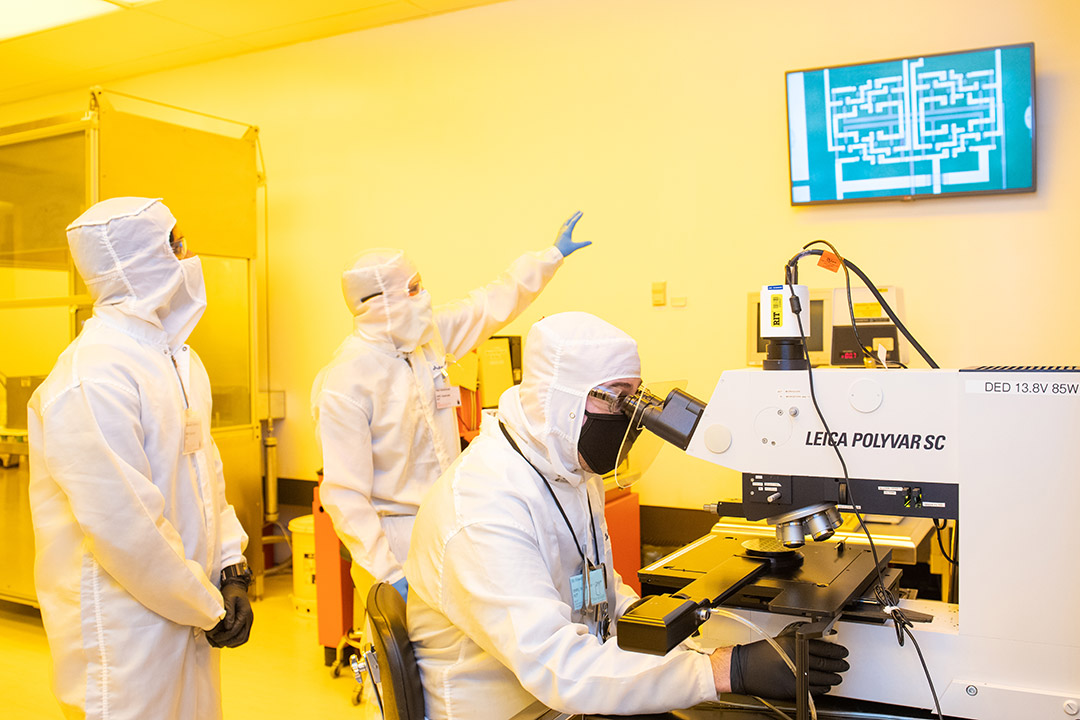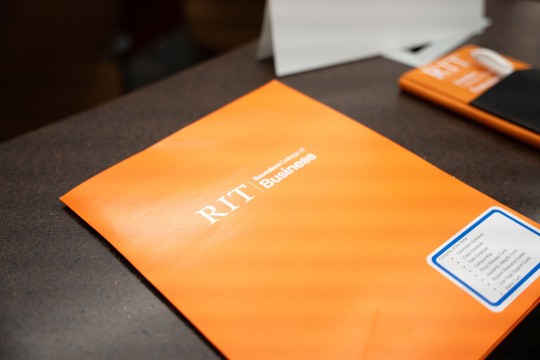New economy majors connect with emerging careers
Gabrielle Plucknette-DeVito
Microelectronic engineering graduate students look at a highly magnified view of an integrated circuit fabricated on a silicon wafer. Students design, fabricate, and test their own integrated circuits in laboratory classes, as well as perform independent research toward a capstone senior design project.
Analytical thinking, complex problem solving, creativity, resiliency, and flexibility are among the top skills needed for emerging careers by 2025, according to the World Economic Forum’s “The Future of Jobs Report,” released in October.
Anticipating these rapid changes in the workplace—further accelerated by lessons learned from the COVID-19 pandemic—RIT is seizing on the opportunity to guide students to “new economy majors” that are multidisciplinary, transformative, and future-focused. From the RIT perspective, new economy majors seek to fill a skills gap faced by employers who must pivot quickly to the realities of the pandemic and the disruption caused by the future division of labor between humans and machines.
New Economy Majors
Here is a sample of new economy majors, which are not easily discovered by students in their search for a major, yet are in demand by employers.
- Digital Humanities and Social Sciences
- Human-Centered Computing
- Imaging Science
- Individualized Studies
- Microelectronic Engineering
- Motion Picture Science
- New Media Design
- New Media Interactive Development
- Packaging Science
- Photographic Sciences
- Robotics and Manufacturing Engineering Technology
- Supply Chain Management
Learn more about new economy majors.
New economy majors occupy a unique area, somewhere between classic majors and those traditionally described as specialized, said Ian Mortimer, RIT’s vice president for Enrollment Management.
For example, packaging science combines elements of engineering, business, design, and sustainability. Imaging science combines physics, math, computer science, engineering, and psychology.
In a home-delivery economy, supply chain management is more than a traditional business degree. Students learn to manage the flow of goods and services around the world by understanding the logistics, planning, inventory demands, transportation, and execution behind moving products from farms and production facilities to their final destinations in warehouses and stores.
“Graduates need to have the skills to stay continuously relevant and have the flexibility, adaptability, and knowledge that allows them to flex in any direction their field requires,” said Mortimer. “All of these majors also incorporate essential tools of team building, effective communication, and leadership.”
Yet despite all the emerging careers needed to transform global economies, Mortimer explained that most of these opportunities remain unknown to young people as they search for a major.
New economy majors break down traditional boundaries and open students up to a whole new world of possibilities, he said. Here, students can combine different interests into concrete skills and cooperative education experiences, and establish successful career outcomes.
“There is still a disconnect. Why aren’t students thinking differently about what they study? I think the answer is because we haven’t helped them do it,” said Mortimer. “The college search system has not kept pace with the academic evolution occurring at some colleges and universities. Let’s challenge the status quo of how we encourage young people to evaluate academic programs.”
New economy majors also align with Generation Z attitudes, where studies show they are driven by purpose and embrace interdisciplinary ways of thinking and working, said Mortimer. “They don’t want to be pigeonholed. They don’t want to be narrowly defined. They play, they’re gadget-y, they explore. They think big and they don’t see boundaries.”
The workforce is automating faster than expected, displacing 85 million jobs in the next five years, according to the World Economic Forum study. Yet with the right moves, the robot revolution has the potential to create 97 million new jobs.
“The World Economic Forum recommends—and RIT endorses—that we must continue to rethink our educational systems, so that we are building a broad, multidisciplinary skill set where creativity is exercised at every turn,” said RIT President David Munson. “As a starting point, each student should choose a discipline for which they have a passion. And then, no matter which discipline is selected, the student should learn about and gain experience in critical thinking, problem solving, creativity, innovation, collaboration, communication, and other high-level skills highlighted by organizations such as the World Economic Forum.”






